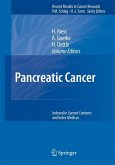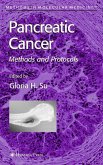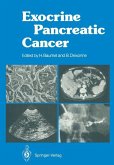A distinguished panel of world authorities reviews the current state of today's understanding, diagnosis, and treatment of pancreatic cancer. Their cutting-edge reviews discuss both medical and surgical modalities and include numerous insights into the basic molecular processes underlying the disease. Among the key topics covered are the prospects for early diagnosis using molecular techniques, the latest diagnostic and therapeutic methods, the role of laparoscopy (diagnostic and therapeutic), and nonsurgical treatment. The reviewers also address the future possibilities for clinical advances, quality of life concerns, and the value of the Japanese "extended Whipple resection." Pancreatic Cancer will become the new standard reference for all clinicians who diagnose and treat this disease, as well as for basic scientists needing a summary of the many recent advances.
i
Hinweis: Dieser Artikel kann nur an eine deutsche Lieferadresse ausgeliefert werden.
i
Hinweis: Dieser Artikel kann nur an eine deutsche Lieferadresse ausgeliefert werden.
". . .a fascinating body of information regarding pancreatic cancer. . .The chapters related to palliative treatment are quite good. . .Overall, this is a very nicely constructed book with the most current information available about pancreatic cancer. The sections discussing diagnosis, particularly molecular diagnosis, are well done. The sections on the operative treatments are considered in great deal and will be of great interest to those who regularly carry out operative treatment with a curative intent for patients with pancreatic carcinoma."-New England Journal of Medicine
"Reber has entitled several renowned experts to contribute to this landmark text that captures and distills "the current state of both the art and the science in the field of pancreatic cancer" (as Reber states in the preface)....Finally, unlike many textbooks on the subject cancer, the book finishes with a discussion regarding quality of life, which, after all, is the most important factor regarding many with the misfortune of developing pancreatic cancer....this book is highly recommended. It will appeal to a broad spectrum of physicians and trainees who seek an overview of the current science and practice in the management of pancreatic cancer and an exciting glimpse into its future."-Gastrointestinal Endoscopy
". . .contitutes the most complete review of ductal adenocarcinoma of the pancreas available. . .an excellent contribution to the surgical literature that addresses the major concepts any surgeon or physician with a particular interest in pancreatic cancer should know."-Archives of Surgery
"Howard Reber produced this book 'in an effort to reflect the current state of both the art and science in the field of pancreatic cancer.' High marks for effort; strongly recommended for all who consider themselves to be engaged seriously in the field."-International Journal of Pancreatology
"Overall this book is well-written and thus suitable for neophytes as well as specialists. I found it very informative, and feel that is should definitely be added to the libraries of clinicians."-Annals of Oncology
"I recommend it primarily to clinicians interested in or working with approaches related to molecular genetics and biology."-World Journal of Surgery, Reviewer: Ingemar Ihse, Lund University Hospital, Sweden
"...the text is well written, easy to read and avoids becoming overly complex, making it fairly easy for a clinician to digest and understand...Most importantly, this book highlights the areas that will be important over the next decade if we are to improve the results of treatment...I can thoroughly recommend this book and suggest that it has a place on the shelf of pancreatic surgeons as well as scientists with an interest in this area"-J. Slavin, GUT
"Reber has entitled several renowned experts to contribute to this landmark text that captures and distills "the current state of both the art and the science in the field of pancreatic cancer" (as Reber states in the preface)....Finally, unlike many textbooks on the subject cancer, the book finishes with a discussion regarding quality of life, which, after all, is the most important factor regarding many with the misfortune of developing pancreatic cancer....this book is highly recommended. It will appeal to a broad spectrum of physicians and trainees who seek an overview of the current science and practice in the management of pancreatic cancer and an exciting glimpse into its future."-Gastrointestinal Endoscopy
". . .contitutes the most complete review of ductal adenocarcinoma of the pancreas available. . .an excellent contribution to the surgical literature that addresses the major concepts any surgeon or physician with a particular interest in pancreatic cancer should know."-Archives of Surgery
"Howard Reber produced this book 'in an effort to reflect the current state of both the art and science in the field of pancreatic cancer.' High marks for effort; strongly recommended for all who consider themselves to be engaged seriously in the field."-International Journal of Pancreatology
"Overall this book is well-written and thus suitable for neophytes as well as specialists. I found it very informative, and feel that is should definitely be added to the libraries of clinicians."-Annals of Oncology
"I recommend it primarily to clinicians interested in or working with approaches related to molecular genetics and biology."-World Journal of Surgery, Reviewer: Ingemar Ihse, Lund University Hospital, Sweden
"...the text is well written, easy to read and avoids becoming overly complex, making it fairly easy for a clinician to digest and understand...Most importantly, this book highlights the areas that will be important over the next decade if we are to improve the results of treatment...I can thoroughly recommend this book and suggest that it has a place on the shelf of pancreatic surgeons as well as scientists with an interest in this area"-J. Slavin, GUT








